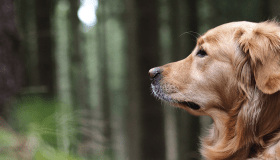
January 18, 2022 – Each year, our Golden Retriever Lifetime Study dogs get lots of biological samples collected, including blood, urine, hair and even toenail clippings. It’s easy to overlook the humble fecal sample in the long list of samples, but as scientists at AnimalBiome know, there’s a lot to learn from the inhabitants of a dog’s gastrointestinal tract.
In the last decade, research on the microbiome has exploded in human medicine, primarily due to advances in technology that allowed scientists to take a closer look at this enormous group of organisms. Veterinary scientists were quick to adopt the new technology to look at the microbiome of animals.
AnimalBiome co-founder and Chief Science Officer Dr. Holly Ganz recognized the potential of the microbiome both from a diagnostic standpoint and also as a therapeutic target. Fecal samples have been collected from Study dogs each year they have participated in the Study. We also have information about the dogs’ health history, medications taken and diet. The combination of data and specimens provides a unique opportunity for Dr. Ganz’s team to learn more about links between the types and abundance of certain gut organisms and disease.
Over the next two years, AnimalBiome will analyze 2,100 stool samples from the Study to better understand the relationship between dog microbiomes and cancer, as well as other health outcomes.
“We’re incredibly excited to be working with Morris Animal Foundation and have tremendous respect for the research they support,” said Dr. Ganz. “We hope our collaboration yields new insights about the potential for earlier diagnosis using microbial biomarkers, and to develop new hypotheses for roles that may be played by the microbiome in the development of cancer. The ultimate goal of the Study is to eventually identify ways to reduce the incidence of these fatal cancers in golden retrievers and all dogs, and we are proud to contribute to this effort.”
AnimalBiome’s scientists will extract DNA from each sample, amplify it, and sequence it to characterize bacteria and fungi in the dogs’ gut microbiomes. The team will compare the microbiome of dogs diagnosed with fatal types of cancer with those that didn’t develop those cancers to detect any associated correlations.




